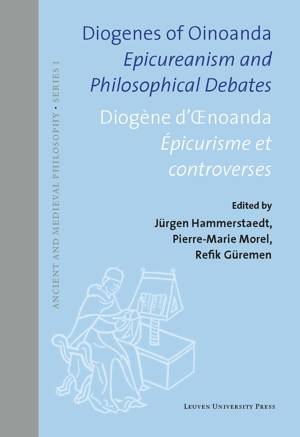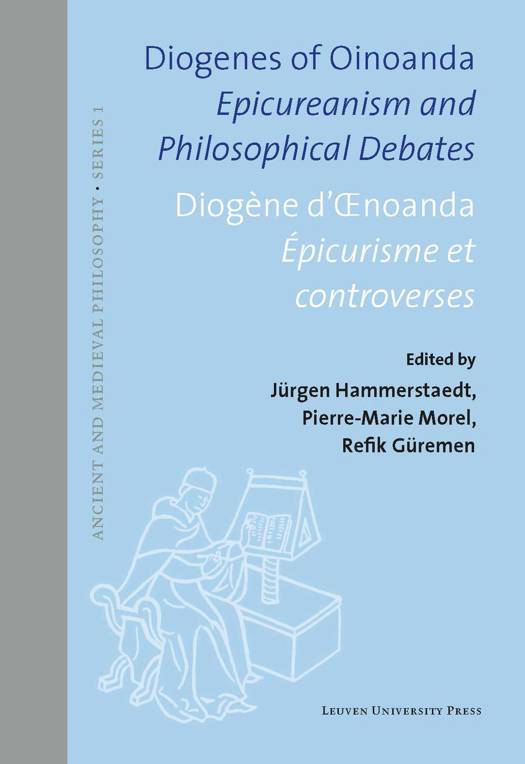
Bedankt voor het vertrouwen het afgelopen jaar! Om jou te bedanken bieden we GRATIS verzending (in België) aan op alles gedurende de hele maand januari.
- Afhalen na 1 uur in een winkel met voorraad
- Gratis thuislevering in België
- Ruim aanbod met 7 miljoen producten
Bedankt voor het vertrouwen het afgelopen jaar! Om jou te bedanken bieden we GRATIS verzending (in België) aan op alles gedurende de hele maand januari.
- Afhalen na 1 uur in een winkel met voorraad
- Gratis thuislevering in België
- Ruim aanbod met 7 miljoen producten
Zoeken
Diogenes of Oinoanda · Diogène d’Œnoanda E-BOOK
€ 78,00
+ 78 punten
Omschrijving
First collection of essays entirely devoted to the inscription of Diogenes of Oinoanda.
First collection of essays entirely devoted to the inscription of Diogenes of Oinoanda.
The texts of Diogenes of Oinoanda (2nd century AD) who invited his readers to an Epicurean life is the largest ancient inscription ever discovered. Over 70 new finds have increased the number of known wall blocks and fragments to nearly 300, offering new insights into Diogenes' distinctive presentation of philosophy. This collection of essays discusses the philosophical significance of these discoveries and is the first of this kind entirely devoted to Diogenes of Oinoanda. Particular attention is paid to his philosophical aims and polemical strategies. Diogenes was apparently well aware of still ongoing philosophical debates, engaging in polemics against Presocratic philosophers, Platonics, and especially Stoics. His views about important issues like happiness, fear, old age, and the afterlife are explained on the bases of Epicurean physics and theology, ethics, politics, theory of knowledge, and psychology.
Les textes de Diogène d'Œnoanda (Deuxième siècle de notre ère), qui invitait ses lecteurs au mode de vie épicurien, constituent la plus grande inscription antique jamais découverte. Les recherches récentes (plus de 70 pièces) ont porté le nombre de morceaux du mur et de fragments à près de 300, offrant ainsi un nouvel aperçu de la pensée propre de Diogène. Les essais réunis dans ce volume, le premier recueil d'articles entièrement consacré à Diogène d'Œnoanda, examinent la signification de ces découvertes. Ils portent une attention particulière aux intentions philosophiques de Diogène et à ses stratégies polémiques. L'épicurien était manifestement bien averti des débats philosophiques de son temps, engageant lui-même la polémique contre les présocratiques, les platoniciens et, plus spécialement, les stoïciens. Ses idées concernant les problèmes fondamentaux du bonheur, de la peur, de la vieillesse et de la vie après la mort ont pour horizon la pensée épicurienne sous ses différents aspects : physique et théologie, éthique, politique, théorie de la connaissance et psychologie.
Contributors: Martin Bachmann (The German Archaeological Institute), Michael Erler (University of Würzburg), Alain Gigandet (University Paris - Est Créteil), Jean-Baptiste Gourinat (Centre National de la Recherche Scientifique/University of Paris - Sorbonne/Ecole Normale Supérieure), Refik Güremen (Mimar Sinan University), Jürgen Hammerstaedt (University of Cologne), Giuliana Leone (University of Naples Federico II), Francesca Masi (University Ca' Foscari of Venice), Pierre-Marie Morel (University of Paris 1 - Panthéon Sorbonne / Institut Universitaire de France), Geert Roskam (KU Leuven), Martin Ferguson Smith (Durham University), Voula Tsouna (University of California), Francesco Verde (La Sapienza University of Rome)
First collection of essays entirely devoted to the inscription of Diogenes of Oinoanda.
The texts of Diogenes of Oinoanda (2nd century AD) who invited his readers to an Epicurean life is the largest ancient inscription ever discovered. Over 70 new finds have increased the number of known wall blocks and fragments to nearly 300, offering new insights into Diogenes' distinctive presentation of philosophy. This collection of essays discusses the philosophical significance of these discoveries and is the first of this kind entirely devoted to Diogenes of Oinoanda. Particular attention is paid to his philosophical aims and polemical strategies. Diogenes was apparently well aware of still ongoing philosophical debates, engaging in polemics against Presocratic philosophers, Platonics, and especially Stoics. His views about important issues like happiness, fear, old age, and the afterlife are explained on the bases of Epicurean physics and theology, ethics, politics, theory of knowledge, and psychology.
Les textes de Diogène d'Œnoanda (Deuxième siècle de notre ère), qui invitait ses lecteurs au mode de vie épicurien, constituent la plus grande inscription antique jamais découverte. Les recherches récentes (plus de 70 pièces) ont porté le nombre de morceaux du mur et de fragments à près de 300, offrant ainsi un nouvel aperçu de la pensée propre de Diogène. Les essais réunis dans ce volume, le premier recueil d'articles entièrement consacré à Diogène d'Œnoanda, examinent la signification de ces découvertes. Ils portent une attention particulière aux intentions philosophiques de Diogène et à ses stratégies polémiques. L'épicurien était manifestement bien averti des débats philosophiques de son temps, engageant lui-même la polémique contre les présocratiques, les platoniciens et, plus spécialement, les stoïciens. Ses idées concernant les problèmes fondamentaux du bonheur, de la peur, de la vieillesse et de la vie après la mort ont pour horizon la pensée épicurienne sous ses différents aspects : physique et théologie, éthique, politique, théorie de la connaissance et psychologie.
Contributors: Martin Bachmann (The German Archaeological Institute), Michael Erler (University of Würzburg), Alain Gigandet (University Paris - Est Créteil), Jean-Baptiste Gourinat (Centre National de la Recherche Scientifique/University of Paris - Sorbonne/Ecole Normale Supérieure), Refik Güremen (Mimar Sinan University), Jürgen Hammerstaedt (University of Cologne), Giuliana Leone (University of Naples Federico II), Francesca Masi (University Ca' Foscari of Venice), Pierre-Marie Morel (University of Paris 1 - Panthéon Sorbonne / Institut Universitaire de France), Geert Roskam (KU Leuven), Martin Ferguson Smith (Durham University), Voula Tsouna (University of California), Francesco Verde (La Sapienza University of Rome)
Specificaties
Betrokkenen
- Uitgeverij:
Inhoud
- Aantal bladzijden:
- 348
- Taal:
- Nederlands
- Reeks:
Eigenschappen
- Productcode (EAN):
- 9789461662217
- Verschijningsdatum:
- 19/05/2017
- Uitvoering:
- E-book
- Beveiligd met:
- Digital watermarking
- Formaat:

Alleen bij Standaard Boekhandel
+ 78 punten op je klantenkaart van Standaard Boekhandel
Beoordelingen
We publiceren alleen reviews die voldoen aan de voorwaarden voor reviews. Bekijk onze voorwaarden voor reviews.











